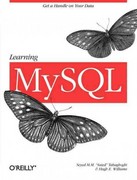Question
1. Case ( A Framework for Information Policies..., 2010) reviews the complexities of information policy development taking into account the multiple factors that contribute to
1. Case (A Framework for Information Policies..., 2010) reviews the complexities of information policy development taking into account the multiple factors that contribute to the complexity, such as the many "stakeholders" with different requirements and the different areas for which policy is developed. He also discusses the need for libraries and information agencies to develop policies that uphold certain responsibilities toward society. Crowe and Anthes (The Academic Librarian...) discuss the early technological developments, the policies that followed these developments and the issues that ensued, which seemed to inhibit maintaining the responsibilities toward society, thus the ethical dilemmas for librarians.
Considering the complexities of information, technology and information policy development, in your opinion, is it feasible to expect ethical deliberation of issues during information policy development? What are you thoughts about Case's "three-by-two framework of dimensions"? (pg. 8)
https://digitalcommons.unl.edu/cgi/viewcontent.cgi?article=1435&context=libphilprac
2. Pasek (2015) reviews the "emerging field of information policy" (pg.286) noting that information policy may have a broad scope (pg. 288) going beyond "government decision-making" (pg. 288) and may encompass "market-driven practices", which may require a different type of regulation. Because of the many definitions proposed by different researchers, Pasek proposes defining information policy using the progressio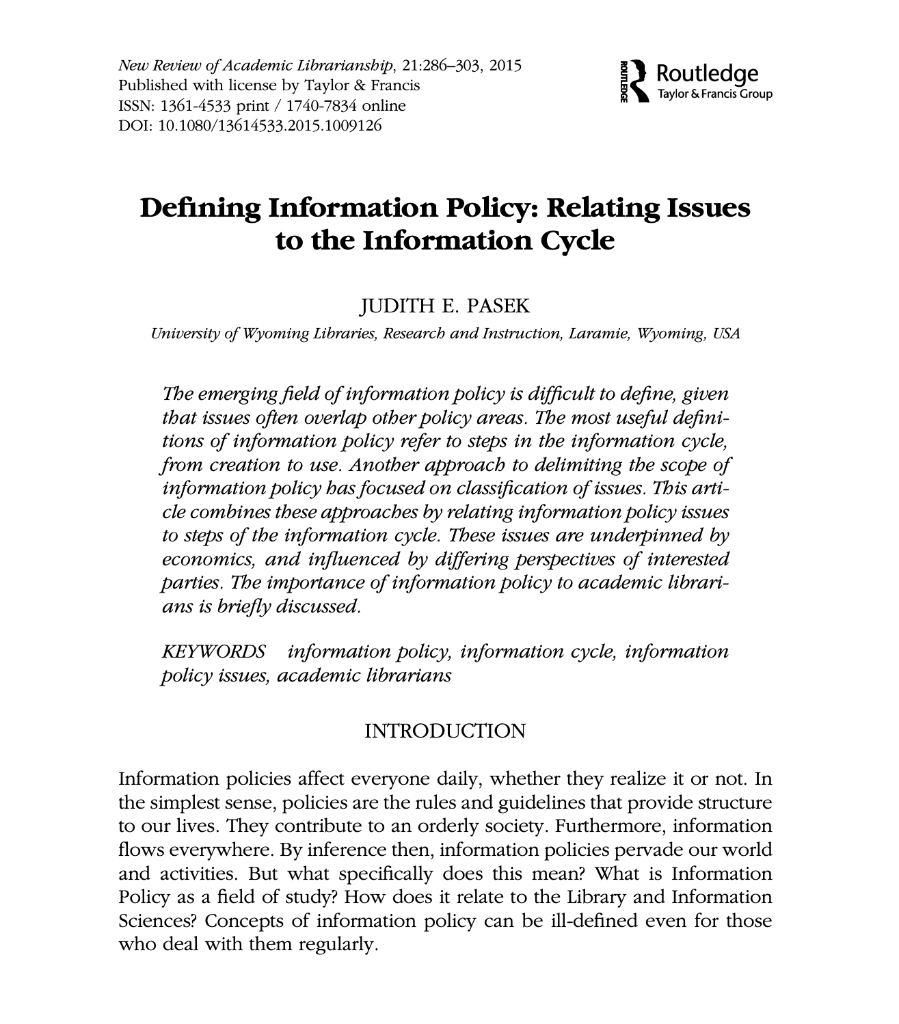
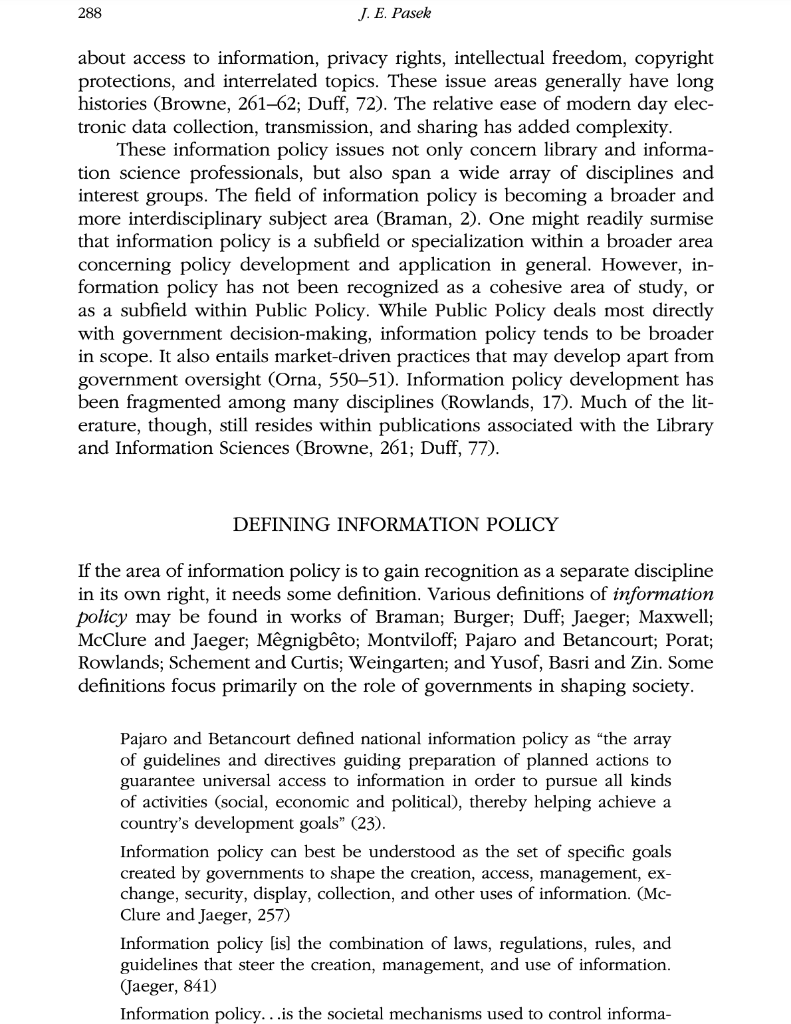
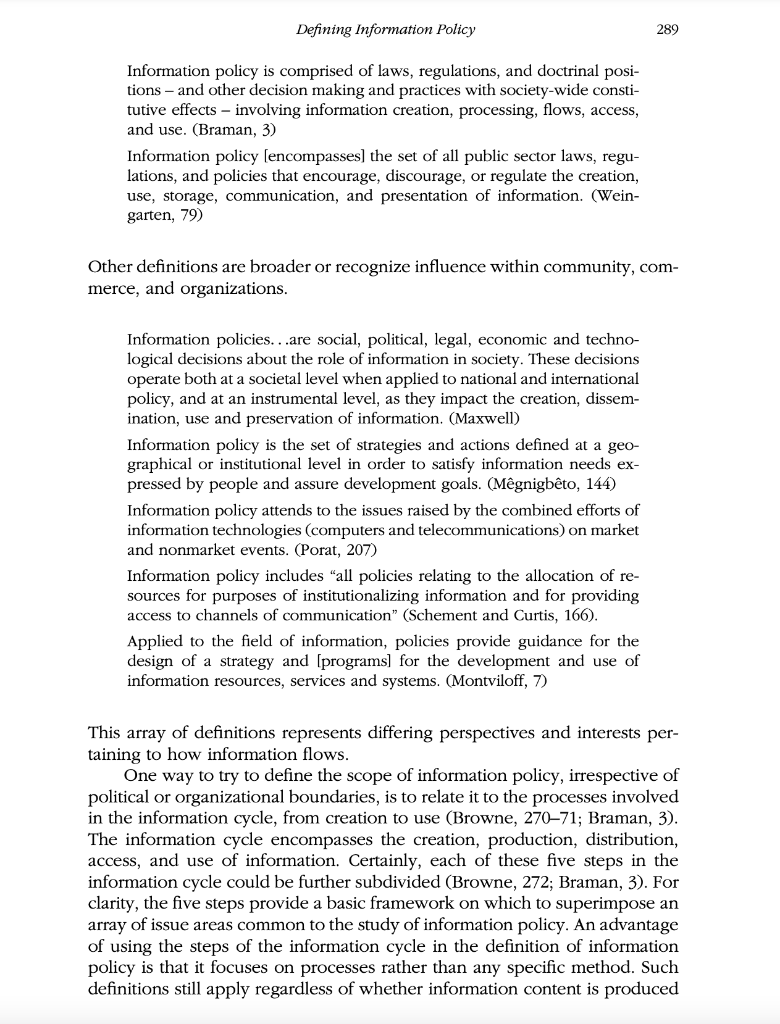
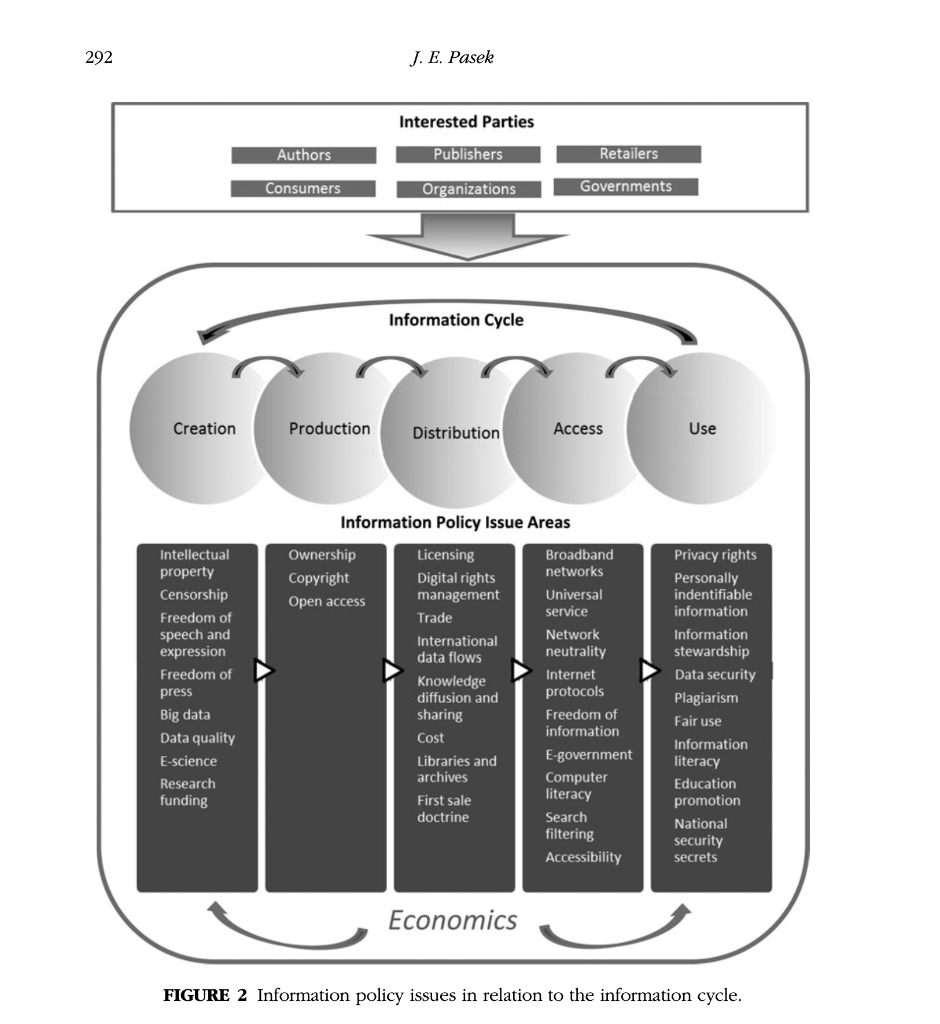 n of information through the "information cycle" (pg. 289), that is, from "creation to use" (pg. 289) and also reviews information policy "issues" and how these could relate to the steps of the information cycle. Figure 2 (pg. 292) provides a good visual of these relationships.
n of information through the "information cycle" (pg. 289), that is, from "creation to use" (pg. 289) and also reviews information policy "issues" and how these could relate to the steps of the information cycle. Figure 2 (pg. 292) provides a good visual of these relationships.
What are your thoughts about the presentation of the information policy issues associated with the steps of the information cycle as they are presented in Figure 2?
New Review of Academic Librarianship, 21:286303, 2015 Published with license by Taylor & Francis ISSN: 1361-4533 print / 1740-7834 online DOI: 10.1080/13614533.2015.1009126 R Taylor & Francis Group Defining Information Policy: Relating Issues to the Information Cycle JUDITH E. PASEK University of Wyoming Libraries, Research and Instruction, Laramie, Wyoming, USA The emerging field of information policy is difficult to define, given that issues often overlap other policy areas. The most useful defini- tions of information policy refer to steps in the information cycle, from creation to use. Another approach to delimiting the scope of information policy has focused on classification of issues. This arti- cle combines these approaches by relating information policy issues to steps of the information cycle. These issues are underpinned by economics, and influenced by differing perspectives of interested parties. The importance of information policy to academic librari- ans is briefly discussed. KEYWORDS information policy, information cycle, information policy issues, academic librarians INTRODUCTION Information policies affect everyone daily, whether they realize it or not. In the simplest sense, policies are the rules and guidelines that provide structure to our lives. They contribute to an orderly society. Furthermore, information flows everywhere. By inference then, information policies pervade our world and activities. But what specifically does this mean? What is Information Policy as a field of study? How does it relate to the Library and Information Sciences? Concepts of information policy can be ill-defined even for those who deal with them regularly. 288 J. E. Pasek about access to information, privacy rights, intellectual freedom, copyright protections, and interrelated topics. These issue areas generally have long histories (Browne, 26162; Duff, 72). The relative ease of modern day elec- tronic data collection, transmission, and sharing has added complexity. These information policy issues not only concern library and informa- tion science professionals, but also span a wide array of disciplines and interest groups. The field of information policy is becoming a broader and more interdisciplinary subject area (Braman, 2). One might readily surmise that information policy is a subfield or specialization within a broader area concerning policy development and application in general. However, in- formation policy has not been recognized as a cohesive area of study, or as a subfield within Public Policy. While Public Policy deals most directly with government decision-making, information policy tends to be broader in scope. It also entails market-driven practices that may develop apart from government oversight (Orna, 55051). Information policy development has been fragmented among many disciplines (Rowlands, 17). Much of the lit- erature, though, still resides within publications associated with the Library and Information Sciences (Browne, 261; Duff, 77). DEFINING INFORMATION POLICY If the area of information policy is to gain recognition as a separate discipline in its own right, it needs some definition. Various definitions of information policy may be found in works of Braman; Burger; Duff; Jaeger; Maxwell; McClure and Jaeger; Mgnigbto; Montviloff; Pajaro and Betancourt; Porat; Rowlands; Schement and Curtis; Weingarten; and Yusof, Basri and Zin. Some definitions focus primarily on the role of governments in shaping society. Pajaro and Betancourt defined national information policy as the array of guidelines and directives guiding preparation of planned actions to guarantee universal access to information in order to pursue all kinds of activities (social, economic and political), thereby helping achieve a country's development goals" (23). Information policy can best be understood as the set of specific goals created by overnments to shape the creation, access, management, ex- change, security, display, collection, and other uses of information. (Mc- Clure and Jaeger, 257) Information policy [is] the combination of laws, regulations, rules, and guidelines that steer the creation, management, and use of information. (Jaeger, 841) Information policy...is the societal mechanisms used to control informa- Defining Information Policy 289 Information policy is comprised of laws, regulations, and doctrinal posi- tions - and other decision making and practices with society-wide consti- tutive effects - involving information creation, processing, flows, access, and use. (Braman, 3) Information policy (encompasses) the set of all public sector laws, regu- lations, and policies that encourage, discourage, or regulate the creation, use, storage, communication, and presentation of information. (Wein- garten, 79) Other definitions are broader or recognize influence within community, com- merce, and organizations. Information policies...are social, political, legal, economic and techno- logical decisions about the role of information in society. These decisions operate both at a societal level when applied to national and international policy, and at an instrumental level, as they impact the creation, dissem- ination, use and preservation of information. (Maxwell) Information policy is the set of strategies and actions defined at a geo- graphical or institutional level in order to satisfy information needs ex- pressed by people and assure development goals. (Mgnigbto, 144) Information policy attends to the issues raised by the combined efforts of information technologies (computers and telecommunications) on market and nonmarket events. (Porat, 207) Information policy includes all policies relating to the allocation of re- sources for purposes of institutionalizing information and for providing access to channels of communication" (Schement and Curtis, 166). Applied to the field of information, policies provide guidance for the design of a strategy and (programs) for the development and use of information resources, services and systems. (Montviloff, 7) This array of definitions represents differing perspectives and interests per- taining to how information flows. One way to try to define the scope of information policy, irrespective of political or organizational boundaries, is to relate it to the processes involved in the information cycle, from creation to use (Browne, 27071; Braman, 3). The information cycle encompasses the creation, production, distribution, access, and use of information. Certainly, each of these five steps in the information cycle could be further subdivided (Browne, 272; Braman, 3). For clarity, the five steps provide a basic framework on which to superimpose an array of issue areas common to the study of information policy. An advantage of using the steps of the information cycle in the definition of information policy is that it focuses on processes rather than any specific method. Such definitions still apply regardless of whether information content is produced 292 J. E. Pasek Interested Parties Authors Publishers Retailers Consumers Organizations Governments Information Cycle ---- Creation Production Distribution Access Use Information Policy Issue Areas Ownership Copyright Open access Intellectual property Censorship Freedom of speech and expression Freedom of press Big data Data quality E-science Research funding Licensing Digital rights management Trade International data flows Knowledge diffusion and sharing Cost Libraries and archives First sale doctrine Broadband networks Universal service Network neutrality Internet protocols Freedom of information E-government Computer literacy Search filtering Accessibility Privacy rights Personally indentifiable information Information stewardship Data security Plagiarism Fair use Information literacy Education promotion National security secrets Economics FIGURE 2 Information policy issues in relation to the information cycle. New Review of Academic Librarianship, 21:286303, 2015 Published with license by Taylor & Francis ISSN: 1361-4533 print / 1740-7834 online DOI: 10.1080/13614533.2015.1009126 R Taylor & Francis Group Defining Information Policy: Relating Issues to the Information Cycle JUDITH E. PASEK University of Wyoming Libraries, Research and Instruction, Laramie, Wyoming, USA The emerging field of information policy is difficult to define, given that issues often overlap other policy areas. The most useful defini- tions of information policy refer to steps in the information cycle, from creation to use. Another approach to delimiting the scope of information policy has focused on classification of issues. This arti- cle combines these approaches by relating information policy issues to steps of the information cycle. These issues are underpinned by economics, and influenced by differing perspectives of interested parties. The importance of information policy to academic librari- ans is briefly discussed. KEYWORDS information policy, information cycle, information policy issues, academic librarians INTRODUCTION Information policies affect everyone daily, whether they realize it or not. In the simplest sense, policies are the rules and guidelines that provide structure to our lives. They contribute to an orderly society. Furthermore, information flows everywhere. By inference then, information policies pervade our world and activities. But what specifically does this mean? What is Information Policy as a field of study? How does it relate to the Library and Information Sciences? Concepts of information policy can be ill-defined even for those who deal with them regularly. 288 J. E. Pasek about access to information, privacy rights, intellectual freedom, copyright protections, and interrelated topics. These issue areas generally have long histories (Browne, 26162; Duff, 72). The relative ease of modern day elec- tronic data collection, transmission, and sharing has added complexity. These information policy issues not only concern library and informa- tion science professionals, but also span a wide array of disciplines and interest groups. The field of information policy is becoming a broader and more interdisciplinary subject area (Braman, 2). One might readily surmise that information policy is a subfield or specialization within a broader area concerning policy development and application in general. However, in- formation policy has not been recognized as a cohesive area of study, or as a subfield within Public Policy. While Public Policy deals most directly with government decision-making, information policy tends to be broader in scope. It also entails market-driven practices that may develop apart from government oversight (Orna, 55051). Information policy development has been fragmented among many disciplines (Rowlands, 17). Much of the lit- erature, though, still resides within publications associated with the Library and Information Sciences (Browne, 261; Duff, 77). DEFINING INFORMATION POLICY If the area of information policy is to gain recognition as a separate discipline in its own right, it needs some definition. Various definitions of information policy may be found in works of Braman; Burger; Duff; Jaeger; Maxwell; McClure and Jaeger; Mgnigbto; Montviloff; Pajaro and Betancourt; Porat; Rowlands; Schement and Curtis; Weingarten; and Yusof, Basri and Zin. Some definitions focus primarily on the role of governments in shaping society. Pajaro and Betancourt defined national information policy as the array of guidelines and directives guiding preparation of planned actions to guarantee universal access to information in order to pursue all kinds of activities (social, economic and political), thereby helping achieve a country's development goals" (23). Information policy can best be understood as the set of specific goals created by overnments to shape the creation, access, management, ex- change, security, display, collection, and other uses of information. (Mc- Clure and Jaeger, 257) Information policy [is] the combination of laws, regulations, rules, and guidelines that steer the creation, management, and use of information. (Jaeger, 841) Information policy...is the societal mechanisms used to control informa- Defining Information Policy 289 Information policy is comprised of laws, regulations, and doctrinal posi- tions - and other decision making and practices with society-wide consti- tutive effects - involving information creation, processing, flows, access, and use. (Braman, 3) Information policy (encompasses) the set of all public sector laws, regu- lations, and policies that encourage, discourage, or regulate the creation, use, storage, communication, and presentation of information. (Wein- garten, 79) Other definitions are broader or recognize influence within community, com- merce, and organizations. Information policies...are social, political, legal, economic and techno- logical decisions about the role of information in society. These decisions operate both at a societal level when applied to national and international policy, and at an instrumental level, as they impact the creation, dissem- ination, use and preservation of information. (Maxwell) Information policy is the set of strategies and actions defined at a geo- graphical or institutional level in order to satisfy information needs ex- pressed by people and assure development goals. (Mgnigbto, 144) Information policy attends to the issues raised by the combined efforts of information technologies (computers and telecommunications) on market and nonmarket events. (Porat, 207) Information policy includes all policies relating to the allocation of re- sources for purposes of institutionalizing information and for providing access to channels of communication" (Schement and Curtis, 166). Applied to the field of information, policies provide guidance for the design of a strategy and (programs) for the development and use of information resources, services and systems. (Montviloff, 7) This array of definitions represents differing perspectives and interests per- taining to how information flows. One way to try to define the scope of information policy, irrespective of political or organizational boundaries, is to relate it to the processes involved in the information cycle, from creation to use (Browne, 27071; Braman, 3). The information cycle encompasses the creation, production, distribution, access, and use of information. Certainly, each of these five steps in the information cycle could be further subdivided (Browne, 272; Braman, 3). For clarity, the five steps provide a basic framework on which to superimpose an array of issue areas common to the study of information policy. An advantage of using the steps of the information cycle in the definition of information policy is that it focuses on processes rather than any specific method. Such definitions still apply regardless of whether information content is produced 292 J. E. Pasek Interested Parties Authors Publishers Retailers Consumers Organizations Governments Information Cycle ---- Creation Production Distribution Access Use Information Policy Issue Areas Ownership Copyright Open access Intellectual property Censorship Freedom of speech and expression Freedom of press Big data Data quality E-science Research funding Licensing Digital rights management Trade International data flows Knowledge diffusion and sharing Cost Libraries and archives First sale doctrine Broadband networks Universal service Network neutrality Internet protocols Freedom of information E-government Computer literacy Search filtering Accessibility Privacy rights Personally indentifiable information Information stewardship Data security Plagiarism Fair use Information literacy Education promotion National security secrets Economics FIGURE 2 Information policy issues in relation to the information cycleStep by Step Solution
There are 3 Steps involved in it
Step: 1

Get Instant Access to Expert-Tailored Solutions
See step-by-step solutions with expert insights and AI powered tools for academic success
Step: 2

Step: 3

Ace Your Homework with AI
Get the answers you need in no time with our AI-driven, step-by-step assistance
Get Started


